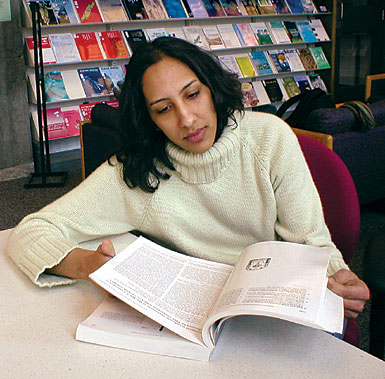Student tries to turn the tide of teen suicide
When a close childhood friend followed her to college at MIT, Urvi Pajvani, now a second-year student at DMS, was delighted. She was equally devastated when her friend committed suicide by setting her dorm room on fire.
That experience, plus Pajvani's interest in mental health, led her to construct a project on teen depression and suicide prevention in the Upper Valley. "I really wanted to do something in memory of my friend," Pajvani explains. "It was horrendous and something that shouldn't happen to someone her age. Like so much of medicine, depression and suicide are completely preventable, but people just don't focus on the prevention."
Signs: Pajvani was originally interested in talking to teens about warning signs for suicide and places they could find help. But her project—which was funded by the Schweitzer Fellowship Program—changed after she did some research.

|
|
Urvi Pajvani has spent a good bit of time during the last
year—when she wasn't immersed in her medical studies—
working to combat teen suicide in the region. |
She discovered that the surgeon general had issued a statement concluding that interventional programs were ineffective at preventing adolescent and teen suicide. In fact, the statement argued that educational programs could be detrimental by causing otherwise healthy teens to consider suicide.
In light of this information, Pajvani realized she could have more impact by educating physicians and other health-care providers in the region. She compiled statistics on how many adolescents attempt or commit suicide in the Upper Valley and compared them to national data. In searching for patterns, she discovered that of teens who commit suicide, 80% of boys also use alcohol and smoke tobacco and 60% of girls also have body-image concerns. She believes it is important for physicians to be alert for these connections in their patients.
Packet: Pajvani developed an information packet that describes screening techniques and conditions associated with suicide, such as a family history of mental health problems or the use of phrases such as "No one would miss me." She especially targeted pediatricians, hoping to strengthen their ability to recognize teen depression.
"I just want to remind healthcare providers that this is a problem. I at least want to make it fresh in their minds," Pajvani says. "I think that doctors know risk factors for suicide but don't think about them on a daily basis."
Having an impact on a complex problem like teen suicide is difficult, Pajvani came to realize. "I guess I won't ever see tangible results from my project," she says. "I won't ever see who I am helping down the road. But maybe my words will help one person who is helping another person."
That indirect effect can be powerful, says her mentor for the project, psychologist Philip Wyzik of West Central Behavioral Health, a member of the Dartmouth-Hitchcock Alliance. "The issue of suicide is a signifi- cant health-care problem in our society," Wyzik explains, but "is often overlooked. . . . However, suicide is preventable if people seek help and if others reach out. Urvi's work will contribute to increasing awareness."
Pajvani hopes to help at-risk teens more directly when she becomes a physician. She has considered entering either pediatrics or psychiatry, but she knows what she's learned will help her in any specialty. "If you're going to be a doctor," she says, "you should be in tune with people's mental health as much as . . . with their physical health."
If you would like to offer any feedback about this article, we would welcome getting your comments at DartMed@Dartmouth.edu.
